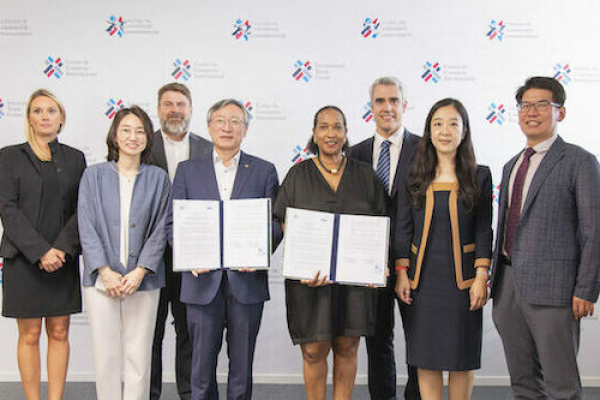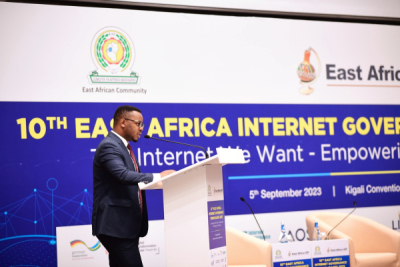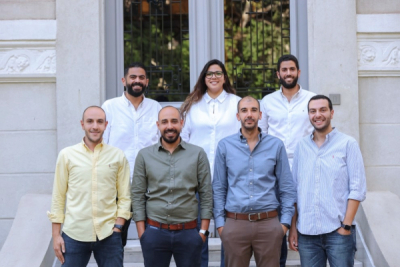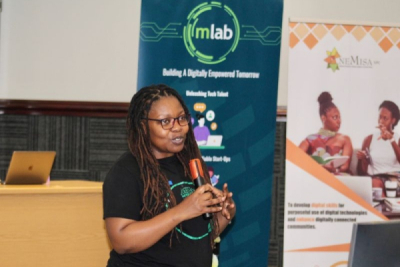With a diverse educational background and a wealth of experience in the technology industry, Jennie Nwokoye is on a mission to transform primary healthcare services in Africa.
Nigerian-born tech entrepreneur Jennie Nwokoye (photo) is the founder and CEO of Clafiya, a startup that is revolutionizing access to primary healthcare by offering convenient, high-quality, and affordable services directly from users' cell phones.
Founded in 2021, Clafiya uses cutting-edge Google Maps Platform technology to enable patients to quickly locate the nearest healthcare providers. This innovative initiative offers patients the option of using USSD (Unstructured Supplementary Service Data) codes or the Clafiya web app to register and schedule face-to-face consultations with nurses and community health workers. As a result, patients receive an accurate diagnosis and treatment recommendations tailored to their needs.
Jennie Nwokoye, the CEO overseeing the operations of this innovative startup, has an impressive and diverse educational background. In 2012, she earned a bachelor's in biomedical sciences, with a minor in anthropology, at the University of Florida. Her thirst for knowledge then led her to earn a master's in medical science and technology at Stevenson University in 2015. Finally, in 2021, she earned a PhD in Systems Engineering at George Washington University.
Her professional career, spanning more than 10 years, started at Procter & Gamble in 2013, in the USA, where she worked as an analytical chemist. She then broadened her horizons by working with prestigious international and government institutions, including as an Intelligence Operations Specialist for the US Department of Homeland Security from 2016 to 2017, and as a Program Manager at Amazon Web Services in 2020-2021.
Jennie Nwokoye's dedication and innovative approach have not gone unnoticed. In 2020, she was honored as the recipient of the Legacy Lab Foundation Fellowship by Team One. The following year, Forbes named her in the “Health and Science” category of its Next 1000 list, which showcases “ambitious sole proprietors [...] who are redefining what it means to build and run a business.” In 2022, her startup, Clafiya, took part in the prestigious Google for Startups Accelerator Africa program.
Beyond her entrepreneurial successes, Jennie Nwokoye is deeply committed to supporting the next generation of entrepreneurs. As a mentor in the Washington-based incubator Halcyon, she has made a significant impact by helping more than a dozen young entrepreneurs raise over $200,000 since 2019.
Melchior Koba
Despite SMEs making up the majority of businesses in developing countries, their engagement in international trade is limited compared to their economic importance. However, the emergence of the digital economy could create new opportunities for SMEs to actively participate in global economic networks.
Korea Technopark Association (KTPA) and the International Trade Centre (ITC) have signed a Letter of Intent to drive the digital transformation of small and medium-sized enterprises (SMEs) in developing countries. The partnership was announced in a press release issued by the ITC on Tuesday, September 5. This strategic partnership, with an initial focus on Kenya, seeks to foster innovation, facilitate technology transfer, and enhance small business capabilities.
In response to the challenges posed by the fourth industrial revolution, this collaboration will leverage the 'Korea Technopark Operational Model' (K-TP Model), serving as an innovative ecosystem. The model will promote cooperation among government entities, industries, research institutions, and academia.
The Letter of Intent outlines various initiatives, including the establishment of Technoparks in developing countries, the strengthening of innovation and technology ecosystems, and the creation of connections between Korean organizations and businesses in these regions.
The primary objective of this partnership, supported by the Ministry of SMEs and Startups of the Republic of Korea, is to support the digital transformation of Kenyan manufacturing SMEs, thereby enhancing Kenya's industrial innovation.
Youngjib Kim, Chairman of the Korea Technopark Association, expressed enthusiasm for the partnership, highlighting KTPA's commitment to fostering innovative ecosystems for manufacturing SMEs in developing nations and contributing to the Sustainable Development Goals.
The collaboration between KTPA and ITC represents a significant step toward promoting technological advancement and economic growth in developing countries through targeted digital transformation initiatives for SMEs.
Hikmatu Bilali
Internet for all is a major development challenge for East African countries. Despite the ambitions stated in national development plans, several countries are struggling to provide better connectivity for their populations. Setting up a joint project could provide a solution to that challenge.
The East African Community (EAC) will be launching an Eastern Africa Regional Digital Integration Project (EA-RDIP 2023-2028) in the coming months. Daniel Murenzi, CAE's Senior ICT Officer, announced the 10th edition of the East African Internet Governance Forum (EA-IGF), held on Tuesday, September 5, in Kigali, Rwanda. The project aims to meet the connectivity needs of countries in the Horn of Africa.
"The Eastern Africa Regional Digital Integration Project is in response to the discussions and recommendations of the 9th East Africa Internet Governance Forum and aims to drive digital market integration by expanding broadband connectivity and improving the digital service environment," said Daniel Murenzi.
The five-year World Bank-backed project aligns with regional priorities, focusing on the need to bridge the digital divide, reduce connectivity costs, and empower marginalized groups such as youth, people with disabilities, and women. The aim is to boost access to broadband and digital services, fostering the development and integration of digital markets in East Africa.
To achieve this goal, the EAC relies on the Internet and partnerships between member states. Strategies will be put in place to ensure that Internet access is affordable for all. In January, East Africa boasted 23.1% Internet penetration, benefiting 110.7 million people, equivalent to 8.4% of its population.
Once implemented, the project will support cross-border connectivity, data harmonization, e-commerce regulations and policies, and the removal of trade barriers, to establish a single digital market.
Samira Njoya
Since 2011, Congo has been served by a single international fiber subsea cable, the WACS. Frequent outages on this infrastructure disrupt Internet services.
On Thursday, September 7, the Congolese Minister of Posts, Telecommunications and the Digital Economy, Léon-Juste Ibombo, launched the construction of a second national backbone network, resulting from Congo's recent connection to the new 2Africa subsea cable.
The 2Africa subsea cable, initiated by Meta (Facebook's parent company), will enable data transmission between Pointe-Noire and Brazzaville at a very high speed of up to 10 gigabytes per second.
According to the Minister of Telecoms, the new network will improve and further strengthen the capacity of what already exists. "The construction of the new Matombi backbone network, which will serve Pointe-Noire, Brazzaville, and the other cities, is the concrete expression of a strong ambition to improve the speed and reliability of electronic communications, facilitate trade and access to international markets, foster technological innovation and encourage the emergence of startups, and strengthen Congo's participation in the global digital economy," he said.
2Africa is the second international subsea cable the Republic of Congo is connected to. In 2011, the country connected to the WACS (West Africa Cable System) cable, on which it mainly depends for broadband Internet services. However, frequent outages on this infrastructure cause disruption to Internet services.
When completed in 2024, the 2Africa cable will be 45,000 km long, making it the longest in the world. It will serve a geographical area (Africa, Middle East, Europe) home to some three billion people, or 36% of the world's population.
In Congo, 2Africa should not only reduce the cost of Internet services but also extend access to these services to millions more people. According to the latest data from the regulator, the country currently has 3.05 million Internet users, equivalent to a penetration rate of 54%.
Samira Njoya
The number of e-commerce platforms is increasing in Egypt, and competition for market share is fierce. Although based in Cairo, this start-up has decided to conquer other cities in the land of the pyramids.
Kenzz is an e-commerce platform developed by an Egyptian startup. It enables users to shop online at competitive prices without going through intermediaries or resellers. The Cairo-based start-up was founded in February 2022 by Ahmed Atef, Mahmoud Al Silk, and Moataz Sami. In October of the same year, it raised around $3.5 million to accelerate its growth in the domestic market.
"We’re going after a completely different segment that Amazon and the big platforms are not looking at as they are centralized in big cities and towards the people who are comfortable buying online. [...] What we’re doing is bringing that experience much closer to the masses and building a reliable, trustworthy e-commerce platform that caters specifically to the mass market, solving for the barriers to buying, whether it’s trust, affordability, and relevance while capitalizing on social engagement and social interaction aspects of e-commerce," explains Ahmed Atef.
Through the Kenzz mobile app –available for Android and iOS devices, users can create accounts with their phone numbers and access the various stores on the platform. Whether for groceries, clothing, home and sports goods, household appliances, or even books, Kenzz has stores specialized in all of those items and more.
It allows users to make group purchases, with friends or family, for up to 65% discounts. Currently, the startup has chosen to develop activities in secondary cities in Egypt. For the time being, Play Store data show rapid growth as the Android version of its app has been downloaded more than 100,000 times.
Adoni Conrad Quenum
Through its unwavering commitment to innovation, mLab Southern Africa is positioning itself as a catalyst for digital transformation in Southern Africa.
mLab (Mobile Applications Laboratory NPC) Southern Africa, founded in 2011, is a technology-focused company that trains innovators and entrepreneurs to make the most of digital opportunities.
It is the result of a collaboration between the World Bank, via its InfoDev project, the Department of Science and Innovation (DSI), the Council for Scientific and Industrial Research in South Africa (CSIR), and The Innovation Hub (TIH), among other stakeholders, to help open up and develop the mobile applications sector in South Africa.
It is part of a regional initiative encompassing Southern African countries. In addition to the members of the consortium that set it up, it relies on a solid network of partners and collaborators from the public, private, academic, and civil society sectors. These include the World Bank, the Finnish Ministry of Foreign Affairs, AfriLabs, Google, and Amazon Web Services.
Along with various partners, it strives to build a dynamic and robust innovation ecosystem. It focuses on empowering youth, women, and disadvantaged communities through digital skills training, business support, and technology development services.
With offices in Limpopo, Gauteng, and the Northern Cape, it offers a wide range of services and programs to support both aspiring technology entrepreneurs and established players in developing their skills, ideas, and products.
It organizes events, training, workshops, and bootcamps for a variety of audiences including school pupils, university students, graduates, professionals, and entrepreneurs wishing to learn about mobile technologies, design, development, and business management.
mLab Southern Africa successfully runs the CodeTribe program, a full-time coding academy designed to train young people from disadvantaged backgrounds to become software developers.
The company offers incubation and acceleration programs for early-stage startups. Through its programs, it offers services such as gap analysis, go-to-market strategies, mentoring, start-up grants, as well as assistance with digital tools and minimum viable product (MVP) development.
Its Innovation Lab is a fertile ground where its team supports the development of digital solutions, particularly those with social impact, and has contributed to the development of solutions for sectors as diverse as education, health, and agriculture.
Melchior Koba
He has over two decades of experience in media, entertainment, and technology. With his new role at Google Africa, he will play a greater role in promoting a digitally inclusive and prosperous future for the entire continent.
Alex Okosi (photo) is a Nigerian-born business executive. Last September 5, he was appointed Managing Director of Google in Africa. At that post, he will lead the company's operations on the continent, including programs to help businesses and economies grow, as well as expand Internet access and provide tools to help the next billion users get more out of the Web.
"I am excited at the prospect of leading Google’s team in Africa and the opportunity to be an even closer part of this diverse and dynamic region, which is so close to my heart," said Alex Okosi. "I’m a firm believer in the potential for technology and, in particular, the internet to improve people’s lives and to help individuals and businesses in Africa to thrive," he added.
The new executive attended university in the United States. In 1998, he graduated from Saint Michael's College with a Bachelor's in Business Administration and Economics. Before joining Google, he spent 22 years (1998-2020) with mass media company ViacomCBS (now Paramount Global). He held several executive positions, including General Manager of the BET International brand. He then worked for YouTube, between 2020 and 2023, as Managing Director of EMEA Emerging Markets.
Throughout his career, Alex Okosi has won several awards. In 2013, he was named Young Global Leader by the World Economic Foundation (WEF). In 2014, he won Up & Coming Future Leader of the Year at the Ai Investment & Business Leader Awards. In 2018, he was a finalist in the All Africa Business Leader Awards. The following year, he was made an honorary member of the National Institute Of Marketing Of Nigeria (NIMN).
Melchior Koba
Nigeria aims to become one of the leaders in the African digital economy. To achieve its goal, it is signing partnerships with countries that share the same objectives.
Nigeria's Minister of Communication, Innovation, and Digital Economy, Bosun Tijani, signed two memorandums of understanding in New Delhi, India, last Wednesday. The first agreement, signed with the Indian Ministry of Electronics and Information Technology, aims to share the best digital solutions that would benefit citizens in both countries.
The second partnership, signed with the Central Square Foundation team, a non-profit organization working to ensure quality school education in India, aims to develop solutions that leverage technology to facilitate education in Nigeria.
“The collaboration between our countries gives us a platform to build on the upward trajectory of digital transformation as a driver of economic growth,” Dr. Bosun Tijani indicated in a post on X (formerly Twitter).
The MoU were signed on the sidelines of the 18th G20 Summit, to be held from Saturday, September 9 to Sunday, September 10 in New Delhi. They come at a time when the Nigerian government is stepping up efforts to attract additional investors to the country, increase funding to support Nigerian innovators and expand resources for local entrepreneurs. With such initiatives, the government wants to create one million jobs in the digital economy and improve digital literacy among the youth.
By choosing India to support those digital projects, Nigeria is making a strategic move. Indeed, in less than 10 years, India's digital penetration rate has more than doubled. In 2015, the world's fifth-largest economy launched "Digital India", an ambitious program to transform India into "a digital society and knowledge economy."
Samira Njoya
The solution behind the startup was established as SmartWage. Later, its founders decided to broaden its offering. So they updated its name.
Jem is a digital solution developed by a South African startup. It enables employers to share documents and information with their out-of-office employees. The Cape Town-based startup was founded, in 2019, under the name SmartWage by Alex Platt, Caroline van der Merwe, Nick Platt, and Simon Ellis. It has raised around $2.5 million to, among other things, support its growth and develop its technology.
"Payslips and leaves are still done manually with paper printouts, while employee communication is done using notice boards or apps, which have huge usage drop-offs. Onboarding and disciplinary procedures are still paper-based, costing businesses precious time, money, and resources," says Simon Ellis.
The digital solution is accessible via WhatsApp instant messaging app, so users won't have to download any apps from the Play Store or App Store. Jem allows users to receive company-wide communications, access payslips, request time off, or even access financial wellness products, all via WhatsApp.
"If we can save employers time and money through digitization, we can bridge the gap between South African enterprises and their frontline employees, helping enterprises connect clearly and dynamically with their employees, whilst offering financial wellness tools at the same time," explains Simon Ellis.
To share payslips via the solution, each employee pays 4.90 rand (approx. $0.26) per month, and to receive all communications, the rate rises to 8.9 rand. The startup also offers access to salary advances that need to be repaid the following month.
Adoni Conrad Quenum
He is an outstanding example of an African entrepreneur who is harnessing blockchain technology to generate a positive impact both on his continent and on the world stage.
Cameroonian-born entrepreneur Ricardo Konlack (photo) is a blockchain enthusiast. As the co-founder and CEO of IoT firm Katika, he is actively involved in revolutionizing the financial landscape in Africa through the adoption of this innovative technology.
His platform, Katika, stands out for its ability to offer innovative solutions perfectly adapted to the needs of African entrepreneurs. It facilitates rapid and secure payments, offers access to credit without the need for intermediaries, encourages savings, and enables investment in local projects.
Katika's mission is to promote financial inclusion, stimulate economic development, and enhance digital sovereignty in Africa. It uses blockchain to establish trust between users, reduce costs, increase transparency, and guarantee data protection. Its platform relies on an active, committed community that contributes to its governance and development.
The platform has benefited from support from several local and international incubators and accelerators, including Founder Institute and ActivSpaces.
Ricardo Konlack graduated from Germany's Technische Hochschule Mittelhessen in 2020, with a degree in civil engineering. The entrepreneur's first company is BrickBuilding, which designs, manufactures, and distributes products for civil engineering, architecture, construction, and public works.
Melchior Koba
More...
SING plays a key role in the digital ecosystem in Gabon and the Central African region as a whole. It provides solutions tailored to the needs of entrepreneurs, businesses, and institutions.
SING (Digital Incubation Society of Gabon) is a private company specializing in digital innovation. Founded in 2018 by business management consultant Yannick Ebibie, it primarily aims to help boost the competitiveness of African businesses by promoting digital transition.
With its PIVOT 4.0 incubator, SING offers customized programs to support the development of digital start-ups. It selects and supports innovative projects in various sectors such as digital, energy, agriculture, health, and education. Start-ups benefit from tailored support, access to state-of-the-art infrastructure, a network of mentors and experts, and financing opportunities.
The incubator also offers training courses leading to qualifications and certification in digital-related fields such as web development, design, digital marketing, and cybersecurity. These courses are accessible at all levels and are designed to enhance learners' skills.
SING also supports companies and institutions in their digital transformation by providing auditing, research, strategy, and customized digital solutions.
Since its creation, SING has supported over 50 digital startups in Gabon, some of which have won national and international awards. In addition, SING has been a key player in the organization or co-organization of digital-related events, such as hackathons, conferences, and workshops. Its ambition is to contribute to the creation of 20,000 jobs in information and communication technologies (ICT) in Gabon by 2025 and to foster the emergence of national digital innovation champions.
Some of the companies it supported include Ultimate CRM, an online prospecting platform designed to improve the sales force, and Ekena, a start-up focused on promoting local tourism through the development of digital solutions for all players in the value chain.
Its partners include the World Bank, Deloitte, eGabon, Gabon Telecom, Vivendi Africa, Total Gabon, and the Ministry of Digital Economy, Communication, and Post.
Melchior Koba
Last Wednesday, Nigerian digital free-zone builder Itana announced it secured $2 million in a pre-seed round led by global venture capitalists LocalGlobe, Amplo, Pronomos Capital, and Future Africa.
The proceeds will support Itana’s efforts to improve the business environment, encourage foreign direct investment, and boost employment in Nigeria.
Technopark is a key player in innovation in Morocco. It helps revitalize the country’s economic fabric and promote youth entrepreneurship.
Launched in 2001 in Casablanca, Technopark is the first technology business incubator to be established in Morocco. It was established by MITC (Moroccan Information Technopark Company), a B2B service company, as a public partnership between the Moroccan Ministry of Industry, the World Bank, the national deposit and consignment fund CDG, Banque Centrale Populaire (BCP), and the now dissolved private equity firm ONA.
Technopark's mission is to facilitate the creation and growth of innovative companies operating in the fields of information and communication technologies (ICT), green technologies (greentech), and the cultural industry. It offers an environment conducive to the growth of start-ups, with a wide range of services including accommodation, mentoring, training, access to financing, market access, visibility, and networking.
Since its creation, Technopark has supported over 3,500 innovative companies, creating more than 15,000 direct and indirect jobs. It currently operates on five sites - located in Casablanca, Rabat, Tangier, Souss-Massa, and Agadir - hosting over 450 companies and regularly serving as a venue for events focused on innovation and entrepreneurship.
The incubator aims to be a strategic catalyst for Morocco's innovative entrepreneurial ecosystem, extending its model to other regions of the country. In the fourth quarter of 2023, Technopark Essouira will be inaugurated, and three other sites planned for Fez, Tiznit, and Oujda will launch in 2024. These new innovation centers will help support local start-ups and foster synergies between the various players in these regions.
Melchior Koba
The National Employers Council of Mali (Conseil national du patronat du Mali-CNPM) will organize the first edition of Salon international du développement accéléré du numérique (SIDAN) in Bamako next November 28-30.
The event, under the theme "Digital Sovereignty and Technological Progress: Vision and Strategies," aims to enable stakeholders in the tech industry to discuss digital issues and the contribution of the digital to the development of Mali.















